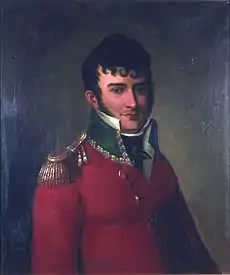Christian Magnus Falsen
Christian Magnus Falsen (14 September 1782 – 13 January 1830) was a Norwegian constitutional father, statesman, jurist, and historian. He was an important member of the Norwegian Constituent Assembly and was one of the writers of the Constitution of Norway.
Christian Magnus Falsen | |
|---|---|
 | |
| Born | 14 September 1782 Christiania, Norway |
| Died | 13 January 1830 (aged 47) Christiania, Norway |
| Nationality | Norwegian |
| Occupation | Jurist |
| Known for | Father of the Norwegian Constitution |
| Spouse(s) | Anna Birgitte Munch Elisabeth Severine Böckmann |
| Children | 3 |
| Parent(s) | Enevold de Falsen (father) |
Biography
Christian Magnus Falsen was born in Christiania, now Oslo, Norway. He was the son of Enevold de Falsen (1755–1808), a dramatist and author of a war song Til vaaben. In 1802, he graduated with a degree in law at the University of Copenhagen. In 1807, Christian Magnus Falsen was appointed a barrister. In 1808 he became circuit judge at Follo and lived in Ås, Akershus Akershus, Norway.[1][2]
After Denmark ceded Norway to Sweden in 1814 he played an important part in politics. Falsen led the Independent Party (Selvstendighetspartiet) that wanted complete independence and was prepared to resist Sweden militarily. He upheld King Christian Frederick and, after the separation of Norway from Denmark, assisted in drafting a constitution for Norway. This document was modeled upon that adopted by France in 1791 and which was approved on 17 May 1814 by the Norwegian Constituent Assembly (Riksforsamlingenat) at Eidsvoll. He was also strongly inspired by Thomas Jefferson and the Constitution of the United States of America. He is often called Father of the Norwegian Constitution — Grunnlovens far. [3][4]
Falsen held a seat in the Storting and generally favored conservative political positions. In 1822 he was appointed Attorney General of the Kingdom, a post which he held for three years. In 1825 he became bailiff for Bergen, and in 1827 president of the Supreme Court. In 1828 he suffered from a stroke and did not return to the office. Christian Magnus Falsen is buried at Gamlebyen Churchyard. Next to his gravestone is the gravestone of his second wife.
In 1804 he married Anna Birgitte Munch (1787-1810), with whom he had the son Enevold Munch Falsen (1810–80). In 1811, after her death, he married Elisabeth Severine Böckmann (1782-1848). She was the widow of Brede Stoltenberg, a brother of the tradesman Gregers Stoltenberg. With her he had the children Henrik Anton Falsen (1813–66) and Elisabeth Christine Falsen (1820–76).[5]
| Wikimedia Commons has media related to Christian Magnus Falsen. |
Note
This article incorporates text from a publication now in the public domain: Gilman, D. C.; Peck, H. T.; Colby, F. M., eds. (1905). New International Encyclopedia (1st ed.). New York: Dodd, Mead. Missing or empty |title= (help)
References
Other sources
- Daa, Ludvig Kristensen (1860) Magnus Falsen, et Bidrag til Norges Konstitutions Historie (Christiana)
- Vullum, Erik (1881) Kristian Magnus Falsen, Grundlovens Fader (Christiana)
- Indrebø, Gustav (1919) Det norske generalprokurørembættet: Chr. M. Falsen 1822-1825 (Christiana)
- Østvedt, Einar (1945) Christian Magnus Falsen: linjen i hans politikk. (Oslo: H. Aschehoug and co)
Related Reading
- Barton, H. Arnold (2002) Sweden and Visions of Norway: Politics and Culture 1814-1905 (Southern Illinois University Press) ISBN 978-0809324415
| Government offices | ||
|---|---|---|
| Preceded by Herman Gerhard Treschow |
County Governor of Nordre Bergenhus amt 1814–1822 |
Succeeded by Edvard Hagerup |
| Preceded by Wilhelm Frimann Koren Christie |
County Governor of Søndre Bergenhus amt 1825–1827 |
Succeeded by Georg Jacob Bull |
| Preceded by Wilhelm Frimann Koren Christie |
County Governor of Bergenhus stiftamt 1825–1827 |
Succeeded by Georg Jacob Bull |
| Legal offices | ||
| Preceded by Johan Randulf Bull |
Chief Justice of the Supreme Court of Norway 1827–1830 |
Succeeded by Jørgen Mandix |